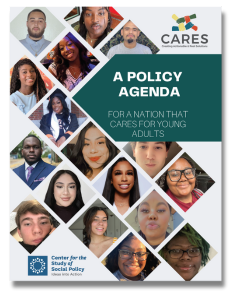Young people play an important role in shaping our society and contributing to their families, their communities, and the broader economy. Their ability to fulfill their hopes and aspirations will ultimately determine our collective future. Young people deserve opportunities that promote
their health and well-being, maximize their power and promise, and support their ability to achieve their goals and dreams. Public policy is indispensable to fulfilling this vision.
“Why is it so hard to get food? Why is it so hard to pay my car payment?”
As young adults are setting out on their own, they face a rapidly changing world, new responsibilities, and enormous challenges and opportunities. Many young adults are simultaneously pursuing personal milestones—achieving education and career goals, starting a family—and navigating the realities of our time: climate change, new technologies that are changing the ways we interact and work, a crisis in affordable housing and child care, and persistent discrimination and exploitation in the labor market.
They are doing this, as so many young people have, in the context of police brutality, racism, transphobia, and other forms of discrimination, many that are targeted at youth or which youth experience in very unique ways. They face these threats as they attempt to make the most of new freedoms to pursue their vision for their own futures.
A product of a collaboration between young adults who have experienced foster care and the Center for the Study of Social Policy (CSSP), our national policy agenda reimagines how policy supports young people.

